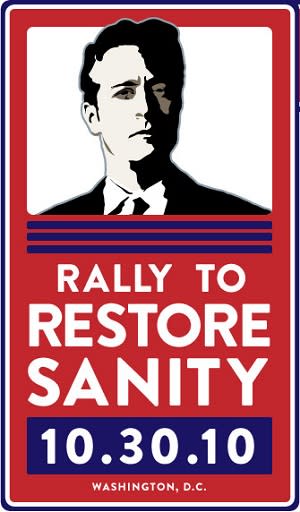 The Upshot
The UpshotNews outlets caution staffers about Stewart-Colbert events

NPR, like many news organizations, restricts its journalists from taking political stands, making campaign contributions, or participating in marches and rallies that the network covers.
Those rules can apply more broadly than just to Democratic or Republican events. NPR told staffers Wednesday that they are not permitted to attend the upcoming Washington events hosted by Comedy Central's Jon Stewart and Stephen Colbert.
NPR Senior Vice President Dana Davis Rehm, in a follow-up memo, said she was surprised at the media interest in NPR's decision to explicitly warn against attending the Stewart-Colbert rallies.
"We've received enormous attention from media of all kinds today about our communication to NPR staff on this question," Rehm wrote. "More press than our coverage of the war in Afghanistan or our investigation of the military's treatment of those suffering from mild traumatic brain injury."
The NPR memo raised the question about the difference between overtly political events versus performances that can be perceived as political. It's not going out on a limb to suggest that attendees at the dueling Oct. 30 events — one to "restore sanity," the other to "keep fear alive" — will lean left, even though neither event is affiliated with the Democratic Party or is galvanizing support behind any particular issue. So the Stewart-Colbert rallies may be viewed through a liberal lens, even though the hosts routinely mock Democrats along with Republicans.
Fox News host Glenn Beck repeatedly claimed that his August event on the National Mall wasn't political and, in keeping with that promise, didn't launch any fiery attacks on the Obama administration, as he does routinely on his TV and radio shows. But with Sarah Palin speaking and attendees waving "Don't Tread On Me" flags — popular with tea party activists — the event was perceived as a conservative gathering.
But why did NPR's management never offer a similar warning before Beck's "Restoring Honor" gathering or the recent progressive "One Nation" rally?
Rehm explained that NPR didn't single out those rallies because "it was obvious to everyone that these were overtly political events" and staff would surely know not to attend.
"It's different with the Colbert and Stewart rallies; they are ambiguous," she continued. "But their rallies will be perceived as political by many, whatever we think. As such, they are off limits except for those covering the events."
The Upshot reached out to several other news organizations to see if they have similar restrictions. An ABC spokesman said that the network has the same policy as NPR and that journalists will be on hand to cover the event, not attend it.
An NBC News spokeswoman responded in a statement: "NBC News prohibits employees who function in an editorial role from participating at partisan events, however on a case by case basis we have permitted msnbc hosts to participate in such events."
And the Washington Post sent out the following memo Thursday to newsroom managers in order to answer staff questions on the subject:
"Events, like those organized by Glenn Beck or involving Jon Stewart and Steven [sic] Colbert, are political, and therefore Post newsroom employees may not participate. By participate, we mean that Post newsroom employees cannot in any way put themselves in a position that could be construed as supporting (or opposing) that cause. That means no T-shirts, buttons, marching, chanting, etc. This guideline does not prohibit Post newsroom employees from observing — that is, watching and listening from the sidelines. The important thing is that it should be evident to anyone that you are observing, as journalists do, not participating, whether you are covering the event or not."
UPDATE: A New York Times spokeswoman responded in a statement: "Yes, we would view these at least in part as political events (despite the comic/satirical elements) and would treat them under our guidelines that advise staffers to avoid such events if they could raise any questions about our impartiality."
The Times guidelines state the following: "Staff members may not march or rally in support of public causes or movements, sign ads taking a position on public issues, or lend their name to campaigns, benefit dinners or similar events if doing so might reasonably raise doubts about their ability or The Times's ability to function as neutral observers in covering the news."
(This post was slightly altered to clarify that the Washington Post memo was sent to newsroom managers and not all newsroom staffers.)
